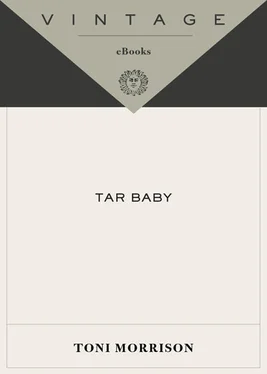Toni Morrison - Tar Baby
Здесь есть возможность читать онлайн «Toni Morrison - Tar Baby» весь текст электронной книги совершенно бесплатно (целиком полную версию без сокращений). В некоторых случаях можно слушать аудио, скачать через торрент в формате fb2 и присутствует краткое содержание. Жанр: Старинная литература, на русском языке. Описание произведения, (предисловие) а так же отзывы посетителей доступны на портале библиотеки ЛибКат.
- Название:Tar Baby
- Автор:
- Жанр:
- Год:неизвестен
- ISBN:нет данных
- Рейтинг книги:3 / 5. Голосов: 1
-
Избранное:Добавить в избранное
- Отзывы:
-
Ваша оценка:
- 60
- 1
- 2
- 3
- 4
- 5
Tar Baby: краткое содержание, описание и аннотация
Предлагаем к чтению аннотацию, описание, краткое содержание или предисловие (зависит от того, что написал сам автор книги «Tar Baby»). Если вы не нашли необходимую информацию о книге — напишите в комментариях, мы постараемся отыскать её.
Tar Baby — читать онлайн бесплатно полную книгу (весь текст) целиком
Ниже представлен текст книги, разбитый по страницам. Система сохранения места последней прочитанной страницы, позволяет с удобством читать онлайн бесплатно книгу «Tar Baby», без необходимости каждый раз заново искать на чём Вы остановились. Поставьте закладку, и сможете в любой момент перейти на страницу, на которой закончили чтение.
Интервал:
Закладка:
Jadine kicked off the sheet and buried her head under the pillow to keep the moonlight out of her eyes, and the woman in yellow out of her mind.
WHEN JADINE had gotten out of bed to stare at the hills, Valerian woke up. He had finished chatting to the ceiling and into his wrist the exact spelling of the message: These iceboxes are brown broken perspective v-i-o-l-i-a-x is something more and can’t be coal note. He had sipped the brandy rather quickly, annoyed by the day’s turn of events, and had lain for a while thinking how impossible it was that, unlike other men, he had been pushed into a presidency but had to fight for his retirement.
When he was thirty-nine he swore that he would quit at exactly sixty-five before he started spending his days traveling from the executive toilet back to his desk where the ballpoint pens mounted on marble had gone dry and his pencils were always long and sharp. That he would never permit himself to become the industrial nuisances his uncles had: stubborn, meddlesome, hanging on to their desks with their fingernails; flourishing once or twice a year when a crisis occurred with an old client or a new F.D.A. official that needed their familiarity or style or some other antiquated company charm. His uncles had been good to him. Their mother (Valerian’s grandmother) had four sons each of whom had married a woman who had only girls. Except Valerian’s mother who delivered one girl and one boy, who was the future of the family. When his father died and Valerian was seven, the uncles gathered to steady everybody and take over the education of their dead brother’s son since it was, they said, “self-understood” that he would inherit the candy factory. And just to show how much they loved and anticipated him, they named a candy after him. Valerians. Red and white gumdrops in a red and white box (mint-flavored, the white ones; strawberry-flavored, the red). Valerians turned out to be a slow but real flop, although not a painful one financially for it was made from the syrup sludge left over from their main confection—Teddy Boys.
“What’s the matter with them?” asked the uncles.
“Faggoty,” said the sales reps.
“Faggoty?”
“Yeah. Like Valentines. Can you see a kid sitting on a curb tossing those fairy candies in his mouth? Seasonal is all we can do. Valentine’s Day. Give us something with nuts, why don’t you?”
Nobody in the East or Midwest touched them. They sat in movie house display cases and on candy store shelves until they were hard as marbles and stuck together like grapes.
“But somebody ’s buying them,” the uncles said.
“Jigs,” said the salesmen. “Jigs buy ’em. Maryland, Florida, Mississippi. Close the line. Nobody can make a dollar selling faggot candy to jigs.”
“But when they move north, don’t they ask for what they got in Mississippi?”
“Hell, no. They’re leaving the South. When they move out they want to leave that stuff behind. They don’t want to be reminded. Alaga syrup is dead in New York. So is Gold Dust Soap and so are Valerians. Close it out.”
But they didn’t close it out. Not right away, at least. The uncles let the item sell itself in the South until the sugar shortage of the early forties and even then they fought endlessly to keep it on: they went to the bathroom, to lunch, read food industry literature and held caucuses among themselves about whether to manufacture a nickel box of Valerians in Mississippi where beet sugar was almost free and the labor too. “Ooooh. Valerian!!” said the box. And that was all. Not even a picture of the candy or a happy face eating it. Valerian appreciated their efforts but recognized them as sentimental and not professional and swore again he would retire exactly at sixty-five if not before and would not let his ownership position keep him there making an ass of himself. After all he was the first partner with a college education and a love of other things. And it was because of these other things—music, books—that all the way through a nine-year childless marriage to a woman who disliked him; all the way through a hateful, shoddy, interminable divorce; all the way into and out of the military service, he could be firm. After the war he went to a convention of industrial food appliance sales in Maine and stepped out for a breath of winter air. There on a float with a polar bear he saw Miss Maine. She was so young and so unexpectedly pretty he swallowed air and had a coughing fit. She was all red and white, like the Valerians. So already at thirty-nine he was showing signs of the same sentimentality his uncles had. It made his resolve even firmer; out of respect for the company, the industry, he would do what they required the Swedes and Germans who worked for them to do—retire at sixty-five. After all, it was a family shop. They had taken a little bit of sugar and a little bit of cocoa and made a good living—for themselves and ninety others, and the people who lived in the factory’s neighborhood stayed there and loved it there largely because of the marvelous candy odor that greeted them in the morning and bid them goodnight. Smelling it was almost like having it and they could have it too, way back then, because damaged lots of Teddy Boys were regularly given to children and homeless men. And when the homeless men found themselves on a train in Oregon or a camp in Boulder, Colorado, they remembered the delicious smell of Philadelphia with far more pleasure than they remembered its women. The childhood of the children growing up in that candy air never quite left, and may have been why they never quite grew up. They moved to Dallas and Altoona and listened to other people’s stories of childhood politely but without envy. They seldom tried to describe their own, because how could you make another person know what it was like? All you could say was “there was a candy factory in our neighborhood and it smelled so good.” So they kept it to themselves and kept their childhood longer than they should have in Dallas and Altoona and Newport News.
And the Street Brothers Candy Company never left the neighborhood or forgot the workers. It expanded, but right on the block and behind the original building; they hired more salesmen and even when they bought machines to do what the Swedish and German women had done they kept them on in other capacities although it was clear they had no need for them—out of respect for Grandmother Stadt and out of respect for the industry. They had six good items by the time Valerian took over and all the women were dead but not the uncles and it was because of this same respect for the industry and its legendary place in the neighborhood and the hearts of those who lived there that he was determined to retire at sixty-five—before he got foolish.
He married Miss Maine and when she had a baby boy he was as relieved as the uncles, but resisted the temptation to introduce a new confection named after his son. By that time they had reduced the size of the Teddy Boys’ hats which nobody connected anymore to Theodore Roosevelt. (An error the uncles encouraged since the candy had been made first by their workaholic mother as a treat for Theodore, her youngest son, and later on to sell for pin money. Hers were big, chocolatey things, like gingerbread boys, but when they went into business they were much smaller.) Now you couldn’t even see the Teddy Boys’ buttons. Through it all Valerian never swerved from his sixty-five timetable. He prepared for it. Bought an island in the Caribbean for almost nothing; built a house on a hill away from the mosquitoes and vacationed there when he could and when his wife did not throw a fit to go elsewhere. Over the years he sold off parts of it, provided the parcels were large and the buyers discreet, but he kept his distance and his dream of getting out of the way at sixty-five, and letting his son take over. But the son was not charmed by Teddy Boys or island retreats. Valerian’s disappointment was real, so he agreed to the company’s sale to one of the candy giants who could and did triple the volume in two years. Valerian turned his attention to refining the house, its grounds, mail service to the island, measuring French colonial taxes against American residential ones, killing off rats, snakes and other destructive animal life, adjusting the terrain for comfortable living. When he knew for certain that Michael would always be a stranger to him, he built the greenhouse as a place of controlled ever-flowering life to greet death in. It seemed a simple, modest enough wish to him. Normal, decent—like his life. Fair, generous—like his life. Nobody except Sydney and Ondine seemed to understand that. He had never abused himself, but he thought keeping fit inelegant somehow, and vain. His claims to decency were human: he had never cheated anybody. Had done the better thing whenever he had a choice and sometimes when he did not. He had never been miserly or a spendthrift, and his politics were always rational and often humane. He had played his share of tennis and golf but it was more for business reasons than pleasure. And he’d had countless discussions with friends and clients about the house he was building in the Caribbean, about land value, tax credit, architects, designers, space, line, color, breeze, tamarind trees, hurricanes, cocoa, banana and fleur de fuego. There had been two or three girls who had helped him enter the fifties (lovely, lovely). Nothing to worry Margaret had she known. Merely life preservers in the post-fifty ocean, helping him make it to shore. There was a moment during the war when he thought some great event was in store for him, but it never happened. He was never sent with the message the world was waiting for. He knew the message was not his, that he had not thought it up, but he believed he was worthy of delivering it. Nothing of the sort befell him, so he returned to civilian life a bachelor, intact. Until he saw Miss Maine (whom a newspaper, published by the envious grandfather of a runner-up, called “a principal beauty of Maine”), looking like the candy that had his name. His youth lay in her red whiteness, a snowy Valentine Valerian. And Bride of Polar Bear became his bride. The disgust of the aunts at his marriage to a teenager from a family of nobodies dissolved with the almost immediate birth of his son. Valerian didn’t need a youth then, the boy was that. Now the boy was a grown man, but perpetually childlike so Valerian wanted his own youth again and a place to spend it. His was taken from him when his father died and his mother and aunts all changed from hearty fun-loving big sisters to grave, serioso mammas who began their duties by trying to keep him from grieving over his father’s death. Luckily a drunken woman did their laundry. And although he stayed on one year past sixty-five to make some changes and another year past that to make sure the changes held, he did manage to retire at sixty-eight to L’Arbe de la Croix and sleep the deep brandy sleep he deserved.
Читать дальшеИнтервал:
Закладка:
Похожие книги на «Tar Baby»
Представляем Вашему вниманию похожие книги на «Tar Baby» списком для выбора. Мы отобрали схожую по названию и смыслу литературу в надежде предоставить читателям больше вариантов отыскать новые, интересные, ещё непрочитанные произведения.
Обсуждение, отзывы о книге «Tar Baby» и просто собственные мнения читателей. Оставьте ваши комментарии, напишите, что Вы думаете о произведении, его смысле или главных героях. Укажите что конкретно понравилось, а что нет, и почему Вы так считаете.











